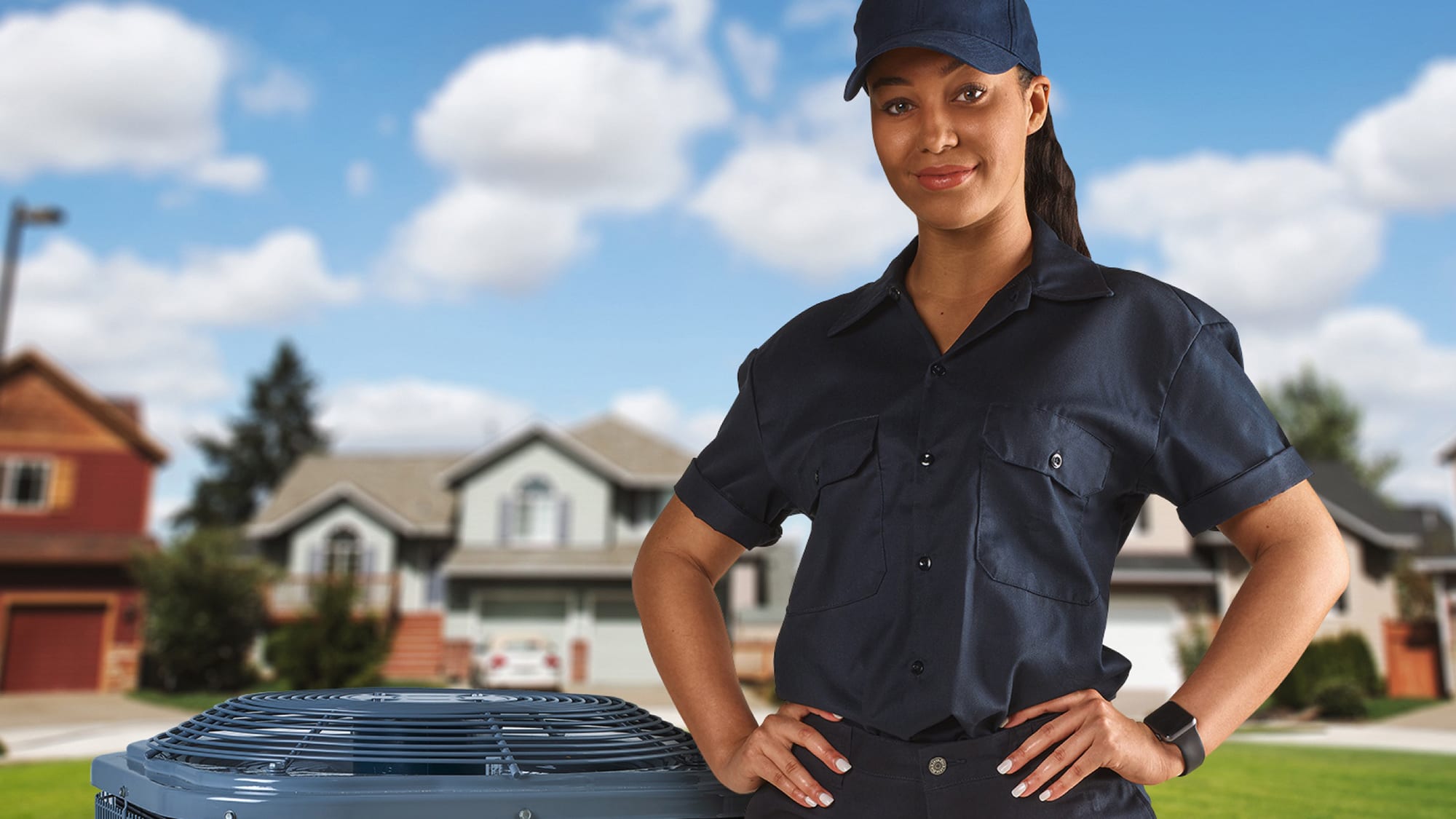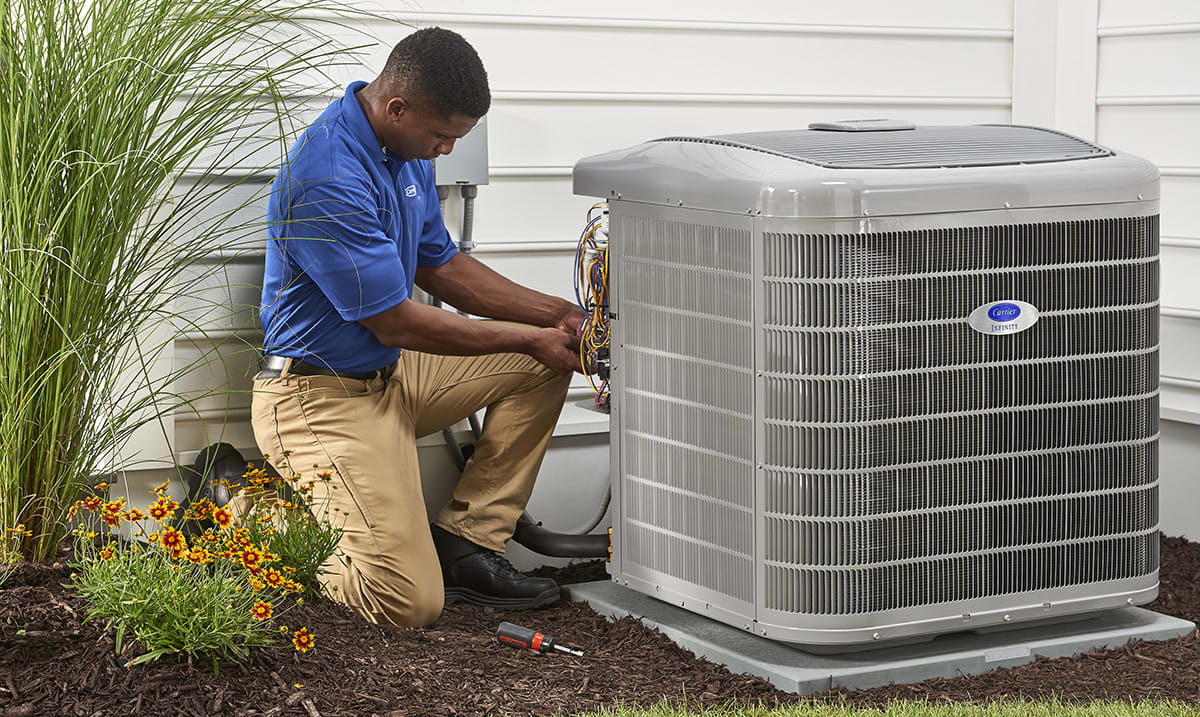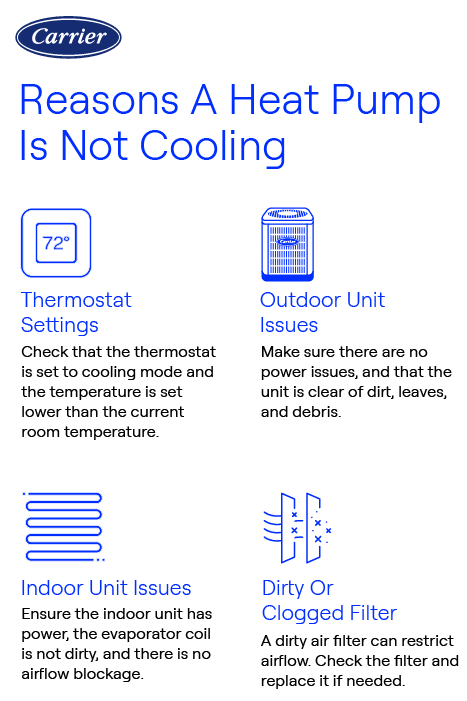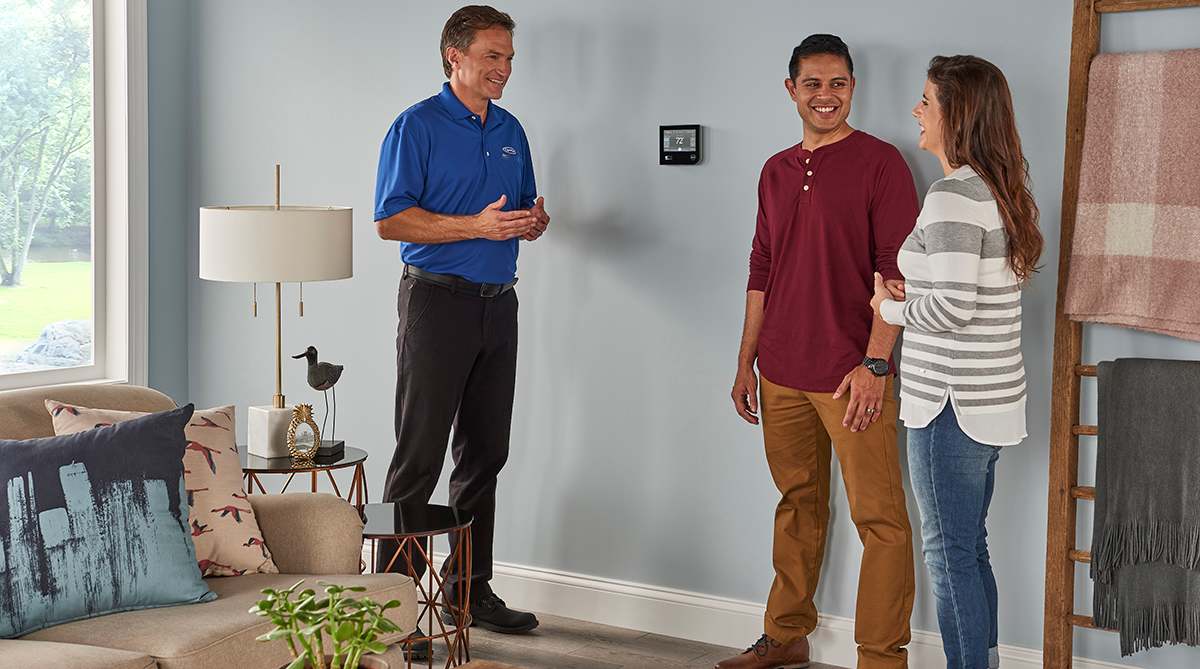Discover Solutions To Heat Pump Not Heating or Cooling or Heat Pump Blowing Cold Air
During the cold weather season, if your heating system is not reaching the room temperature set on your thermostat, and you’ve been waiting a long time, it’s time for some heat pump troubleshooting. Knowing a little about how a heat pump works is important, because the heat pump could be functioning normally even though you are not currently comfortable. The actual issue can often be attributed to thermostat settings, extremely cold conditions outside, or even a clogged air filter.

Troubleshooting – Heat Pump Blowing Cold Air
Here are some of the top answers to the question, “why is my heat pump blowing cold air?” and how to determine when it’s time to contact your local Carrier expert for heating repair:
- Incorrect thermostat settings – If your heat pump is operating and you feel cool air from the registers, check to see if the thermostat is set to heat. If it is set to cool or on constant fan, it will blow cool or cold air. Correct the settings. If that doesn’t fix the problem, don’t hesitate to call a professional. Keep in mind that air from a heat pump register may not be as toasty warm as air from a gas furnace register.
- Uncalibrated or faulty thermostat – If the temperature setting on your thermostat is off by a few degrees, it may not be properly calibrated. This can happen due to a number of reasons, including dirt buildup or accidentally bumping it. To re-calibrate, follow the thermostat’s instructions/user manual.
- Circuit breaker is tripped – If your heat pump is not operating at all, check your electrical panel. Your heat pump outdoor unit should be on its own high voltage (220v or 240v) breaker. The indoor unit will be on a separate breaker. If either or both are tripped, follow standard safety precautions to reset the breaker and turn the system on. If the breaker keeps tripping, it’s a good idea to call a professional.
- Outdoor unit power disconnect – Your outdoor unit has its own, dedicated power disconnect switch, typically mounted on the exterior of your home, close to the outdoor unit. Make sure it is in the “on” position. If a fuse in this box is blown, call a contractor to replace.
- Indoor unit power switch – There is a power switch typically located on the indoor air handler unit (furnace or fan coil) in your home that looks similar to a light switch. It should be in the “on” position.
- Dirty air filter – If your air filter is excessively dirty or clogged it can lead to reduced airflow. In more extreme cases, airflow can become completely blocked or the system can shut down. In either case, locate and check your system’s air filter, usually in or near the indoor unit. Clean or replace the filter. For more detail on this, go to our page dedicated to how to change a filter.
- Leaking duct – Duct leakage can rob your home of efficiency and comfort faster than you think. If you have reduced/weak airflow from your heat registers and higher energy bills, you may have duct leakage. You can check any exposed ductwork for leakage by simply holding your hand over connection points or seals. However, most of your ductwork is behind walls, ceilings or floors, so diagnosis might be better with an HVAC contractor using specialized equipment.
- Frozen outdoor unit – If your outdoor unit is frozen, your system won’t be able to transfer heat from outside into your home. Visually inspect the outdoor unit for frost/ice on the copper tubing between the house and the unit, or frost/ice buildup on the outdoor unit coil. A frozen outdoor coil is best remedied by a professional HVAC technician. While some frost buildup on the heat pump is normal (and there is a built-in defrost mode to periodically remove the frost), excessive ice buildup is an issue that should be addressed by a professional. Learn more in our article will a frozen AC fix itself?
- Low refrigerant charge – If your system is low on AC refrigerant charge, it won’t be able to keep up with either heating or cooling demand. Another sign of low refrigerant charge is a frozen coil. Call your Carrier dealer if you suspect low refrigerant charge. Your dealer has the equipment to check the charge, repair any leaks, and re-charge the system.
- Bad reversing valve – If you have a heat pump not heating, but it works in cooling mode, you might have a bad reversing valve. This is a job for your local Carrier expert.
Heat Pump Not Working In Cold Weather
Because many heat pumps can lose efficiency as outdoor temperatures fall below freezing, your system probably has a supplemental heat source – either electric resistance heating elements, or a gas or oil furnace. If your heating issue is with your outdoor unit, you may be able to rely on your supplemental heat source for comfort until your contractor arrives. On many systems, there will be an “emergency heat” option for this. Be aware that relying only on electric resistance heating may result in a much higher electric bill.

Heat Pump Not Cooling

If you own a heat pump, it acts like an air conditioner to cool your home in the summer months. There are many reasons why a heat pump may not be cooling effectively, including thermostat settings, outdoor unit issues, indoor unit issues, dirty/clogged filters, or a dirty/clogged outdoor coil. More information on each issue is below:
- Thermostat settings - Start by checking to make sure the thermostat is set properly. If it is on heat mode or constant fan, it may be operating, but blowing warm air. Adjust the thermostat so it is set to cool or the “auto” setting. Continue by decreasing the temperature by a few degrees and monitoring for a change in room temperature.
- Outdoor unit issues – Check for a tripped circuit breaker and visually inspect the outdoor unit to ensure it is running. If the circuit breaker continuously flips off, it may be a sign that your unit is malfunctioning, has a broken component, or an electrical issue.
- Indoor unit issues – If the heat pump is running, but pumping warm air, and the thermostat checks out, you may be low on refrigerant or have a faulty reversing valve. If there is no airflow, check your power switch or circuit breaker.
- Dirty/clogged filter - A clogged filter or other blockages in the indoor blower can result in air becoming obstructed and weak/no airflow into your home. Inspect and clean/replace your air filter if necessary. Learn more about air filters and how often to change air filters.
- Dirty/clogged outdoor coil – Things like cottonwood and other dirt and debris can build up on your outdoor coil and reduce its ability to transfer heat effectively. The outdoor coil should be cleaned during regular system maintenance.
These are only a few of the common, quick fixes for heat pumps that are not cooling. For more extensive issues, or emergency heat pump repairs, do not hesitate to contact a professional HVAC dealer. Your comfort and your energy bills will thank you when you do!
When to Call an Expert for Heat Pump Not Heating
Let’s face it. Heat pumps can be complicated. And while there are a number of issues that can be quickly and easily remedied by the average homeowner, some repairs will require a heat pump service appointment with a qualified, professional HVAC technician to diagnose and resolve the problem. And when that is the case, we recommend contacting your local Carrier HVAC dealer before a small problem becomes a bigger repair bill.

Frequently Asked Questions About Heat Pumps Not Heating
- What is a heat pump?
- Find out more about heat pump efficiency
- Get information about the cost of a heat pump
- Heat Pumps: A Sustainable Comfort Solution
- Discover heat pump tax credits
- Learn about heat pump installation

